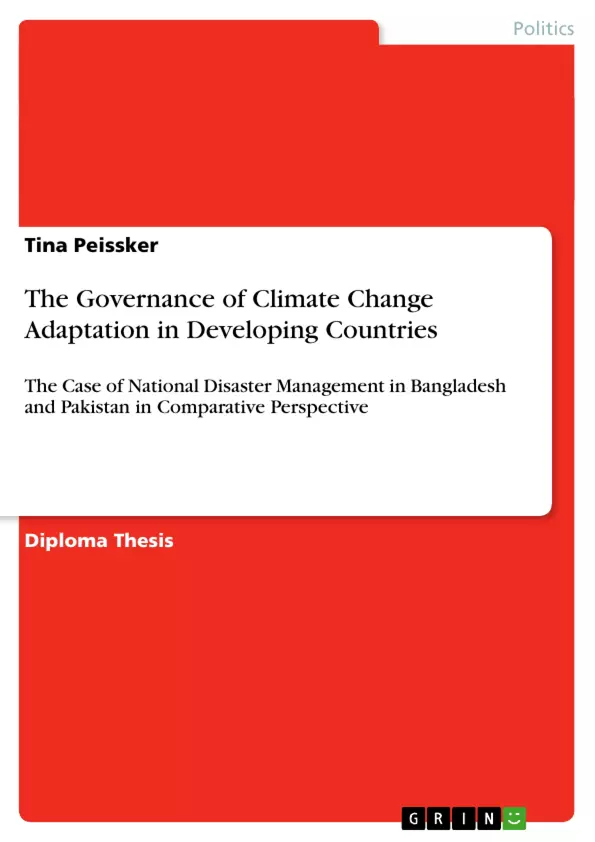The prospects that global climate change will have adverse effects on human societies opened up a discourse about how adaptation should be managed. In order to finance adap-tation measures, the parties of the Kyoto Protocol recently established the Adaptation Fund in 2007. In view of the limited resources that are available for adaptation, scales for the prioritization of countries according to their suspected vulnerability have been developed in the literature. Indicators of vulnerability highlighted within this literature, only reflect the indicators of human development and therefore fail to capture the complex structures of vulnerability. The collective learning approach assumes that vulnerability can be significantly decreased when governance systems adapt to external changes through collective learning processes. The present thesis connects to this notion and therefore assesses the influence of collective learning processes on the vulnerability of the Bangladeshi and Pakistani society towards flood hazards. It does so in order to find a determinant of vulnerability that is able to capture its complexity. Following a case study comparison that is based on a systematic research on primary and secondary literature this study reconfirms that vulnerability can substantially be decreased in the presence of collective learning processes.
Inhaltsverzeichnis (Table of Contents)
- Introduction
- State of Research
- Theoretical Framework and Conceptualization
- Governance in Social-Ecological Systems
- Vulnerability and Adaptation to External Stressors
- Collective Learning Processes in Social-Ecological Systems
- Research Design and Methodology
- Case Study Selection
- Why Study Floods in Developing Countries?
- Comparative Method and Case-Studies
- Case Study of Bangladesh
- Parameters of Flood and Disaster Management
- Political Transition and the Governance of Flood Management
- Complexity of Flood Disasters and Vulnerability
- Learning Processes in the Governance of Flood Management before 1988 until Recently
- Development Prior to 1988
- Changes after the Floods of 1988
- Changes after the Floods of 1998
- Collective Learning Processes in the Governance of Flood and Disaster Management in Bangladesh
- The Case Study of Pakistan
- Parameters of Flood and Disaster Management
- Political Transition and Flood Management
- Complexity of Flood Disasters and Vulnerability
- Learning Processes in the Governance of Flood Management after 1971
- Development in the Flood and Disaster Management after 1971
- The Floods of 2010 and their Aftermath
- Collective Learning Processes in the Governance of Flood and Disaster Management in Pakistan
Zielsetzung und Themenschwerpunkte (Objectives and Key Themes)
This thesis explores the influence of collective learning processes on the vulnerability of Bangladeshi and Pakistani societies to flood hazards. It investigates the ability of governance systems to adapt to external changes through collective learning and its impact on vulnerability reduction.- The role of collective learning processes in disaster risk reduction
- The impact of governance systems on vulnerability to flood hazards
- A comparative analysis of Bangladesh and Pakistan's experiences with flood management
- The effectiveness of adaptation measures in reducing vulnerability
- The challenges and opportunities presented by climate change in developing countries
Zusammenfassung der Kapitel (Chapter Summaries)
The introduction provides an overview of the research's state of research, theoretical framework, and methodology. It highlights the importance of collective learning processes in governance systems and their potential for reducing vulnerability to external stressors like floods. The chapter also outlines the research design, case study selection, and the reasons for focusing on flood hazards in developing countries. The second chapter presents a case study of Bangladesh, exploring the parameters of flood and disaster management, including political transitions and the complexity of flood disasters. It analyzes the evolution of flood management practices, highlighting key learning processes that have taken place before and after major flood events. The chapter concludes by examining the role of collective learning processes in the governance of flood and disaster management in Bangladesh. The third chapter delves into the case study of Pakistan, analyzing its flood management parameters and political transitions. It explores the learning processes that have occurred since 1971 and investigates the impact of the 2010 floods and their aftermath. The chapter also examines the presence of collective learning processes in Pakistan's governance of flood and disaster management.Schlüsselwörter (Keywords)
This study focuses on the themes of climate change adaptation, flood management, vulnerability reduction, collective learning, governance, disaster risk reduction, and the comparative analysis of Bangladesh and Pakistan. It explores the intersection of social-ecological systems and governance, emphasizing the importance of adapting to external stressors and the potential for collective learning to improve disaster resilience. The research investigates the influence of human development and governance structures on vulnerability, drawing insights from case studies in developing countries.Frequently Asked Questions
How does collective learning affect vulnerability to floods?
The research suggests that vulnerability can be significantly decreased when governance systems adapt through collective learning processes, allowing for better disaster management.
What are the case studies analyzed in this thesis?
The thesis compares the governance and flood management systems of Bangladesh and Pakistan, specifically looking at how they have evolved after major flood events.
Why are indicators like human development insufficient to measure vulnerability?
Standard indicators often fail to capture the complex structures of vulnerability, such as governance quality and the ability of a society to learn and adapt to external stressors.
What was the impact of the 1988 floods in Bangladesh?
The 1988 floods were a turning point that led to significant changes and learning processes in Bangladesh's governance of flood and disaster management.
What role does the Adaptation Fund play?
Established under the Kyoto Protocol in 2007, the Adaptation Fund aims to finance concrete adaptation measures in developing countries vulnerable to climate change.
- Quote paper
- Tina Peissker (Author), 2011, The Governance of Climate Change Adaptation in Developing Countries, Munich, GRIN Verlag, https://www.grin.com/document/199865



